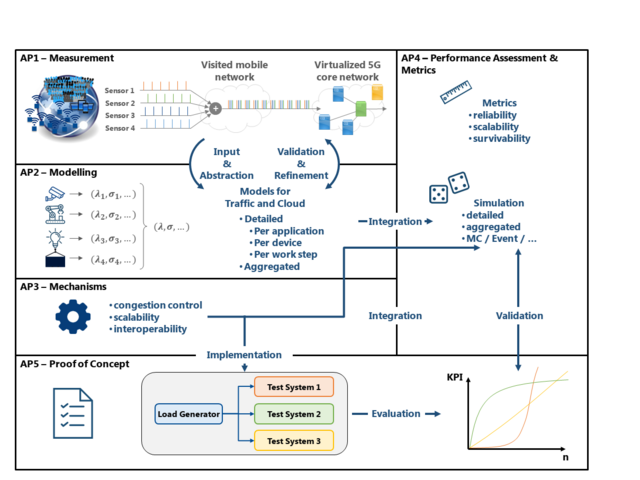Massive Scaling Techniques for Fully Virtualized 5G Mobile Core Networks in the Context of the Internet of Things (5CALE)

| Partner | EMnify GmbH |
| Funded period | February 2019 - January 2022 |
| Researcher | Dr. Florian Wamser Stefan Geißler |
| Funding Organization | Bayerisches Staatsministerium für Wirtschaft, Landesentwicklung und Energie |
Project Description
Massive machine-type communications (mMTC) in the Internet of Things area requires new load balancing, congestion control, scaling, and network survivability techniques for 5G mobile networks. This project addresses the modeling, investigation, and pre-commercial implementation of appropriate mechanisms for managing an immense number of globally distributed network subscribers with a large number of connected network operators based on a distributed, fully virtualized, and cloud-based 5G infrastructure. Project partner of the Chair is the EMnify GmbH. The EMnify GmbH is a commercial provider of a worldwide mobile network in the Internet of Things.
Today, the potential created by the software-based, virtualized network infrastructure is being exploited only by cloud giants like Amazon, Google, and Facebook. An important technical innovation of this project is the examination of the transferability and subsequent application of these approaches to the mobile sector in the context of the Internet of Things. This first requires an exact understanding of the system, which should be gained by characterizing and modeling novel traffic flows in IoT networks. In addition to this scientifically relevant characterization of device traffic, the development of simulation models, which can handle the massive number of devices resulting from the IoT context, is one of the most important scientific innovations for this project. From a technical point of view, the approaches developed for scalability, overload control and network survivability should be mentioned as an important innovation feature.
Work objectives
- Methods for functional and stochastic scalability of a fully virtualized, cloud-based based 5G mobile core network.
- Overload control and network survivability in the context of the Internet of Things.
- Improve the efficiency and efficiency of the overall system.
- Pre-commercial implementation (proof of concept).
Challenges
- Modeling of new types and patterns of traffic for realistic load description and modeling virtualized core network functions in the cloud.
- Evaluation methodologies and design of a simulation to study functional and sustainable stochastic scalability.
- Definition of relevant technical and economic metrics and performance evaluation of the common methods such as scaling, overload control and network survivability.
- Assessment of the overall performance of the system according to various economic and technical criteria.
The cooperation between the University of Würzburg with its expertise in the fields of traffic modeling and simulation and EMnify GmbH with its expertise in software-based core networks and IoT offers numerous advantages. On the one hand, theoretical and abstract models can be formed, evaluated and validated through the exchange of realistic traffic and cloud data. On the other hand, from the insights gained in this way, practice-relevant mechanisms for scalability, overload control and survivability can be developed and evaluated with regard to their performance in a real system.

Overview of and connection between the work packages of the 5CALE project.
Find more information here.
Related Publications
-
Identification of Signaling Patterns in Mobile IoT Signaling Traffic. . In WueWoWAS 22 - KuVS Fachgespräch - Würzburg Workshop on Next-Generation Communication Networks. 2022.
-
Characterizing Mobile Signaling Anomalies in the Internet-of-Things. . In 2nd IFIP/IEEE International workshop on Fully-Flexible Internet Architectures and Protocols for the Next-Generation Tactile Internet (FlexNGIA). 2022.
-
Performance Evaluation of Next-Generation Data Plane Architectures and their Components. Technical Report (PhD dissertation), . . PhD dissertation. University of Würzburg, 2022, April.
-
Data Usage in IoT: A Characterization of GTP Tunnels in M2M Mobile Networks. . In 2nd IFIP/IEEE International workshop on Fully-Flexible Internet Architectures and Protocols for the Next-Generation Tactile Internet (FlexNGIA). 2022.
-
Anonymized GTP Tunnel Trace in Mobile IoT. . 2022, February.
-
Signaling Traffic in Internet-of-Things Mobile Networks. . In IFIP/IEEE International Symposium on Integrated Network Management (IM 2021). Bordeaux, France (Virtual Conference), 2021.
-
Modeling of Traffic Flows in Internet of Things Using Renewal Approximation. . In International Conference on Optimization and Decision Science (ODS2019). 2019.


